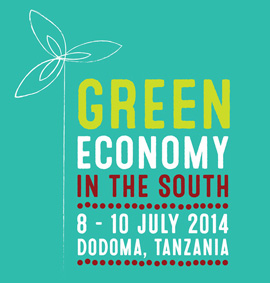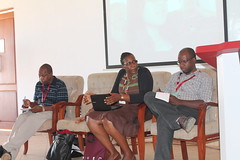By Ruth W. John (M.A student, Geography and Environmental Management, UDSM).
The Green Economy in the South conference succeeded in bring together different scholars from different part of the world. These scholars presented and discussed academic papers ranging from mining, tourism, forestry, wildlife, environmental governance, carbon conservation, political ecology, Wildlife Management Areas, agricultural modernization, climate change, Green economy, biofuels etc.
Unlike many conferences, though, this one was not all about presentation of papers and discussions at plenary and panels. It also included other interesting and entertaining sessions relevant to the conference themes. One such event was the Land Rush game. The game is about the dynamics revolving around land use, and is very applicable to many African situations, in that it addresses issues of land grabbing associated with green economy investments. Here is a very quick ABC of how to play.
Four to five people are required to play the game. The players take the role of rich, middle class and poor farmers who compete for scarce land resources in a competition to acquire as much land as possible. The game is played on four grids laid on a table representing the land to be bought. The poor farmers are affected by land grabbing, market dynamics and seasonal variations. Players participate in different events that may unexpectedly change their stakes.
The link between the Land Rush game and the real world
The game allows people to understand the different positions of rich farmers and poor farmers in the farming sector. Rich farmers continue to be rich while poor farmers (if they are not careful) will stay poor. Rich farmers can afford to plant many crops, buy good quality seeds, buy more land, buy medicines (if the plants are affected by the diseases) and use modern instruments of farming like tractors. Land, medicine and modern machinery are largely unaffordable for poor farmers.
A poor farmer, then, minimizes risks instead of maximizing profits. Poor farmers are most likely to be affected by the natural calamities like floods, climate change, diseases, drought and earthquake. The Land Rush game also shows the way which rich farmers have accumulated wealth through land grabbing, investments and corruption. Players experience joy when they get a big return, while other players can experience frustrations when they receive a low return.
The advantages of Land Rush
Land Rush is a good way of learning by involving students in the practicalities rather than just reading books. It is a simple way of understanding natural resources management. Through playing the game it is easier to see how rural areas in developing countries have differences in social class. These social classes need to be looked into properly in order to understand the class which each farmer belongs to. Poor farmers have to know how to use the little money they have for buying plots and good quality seeds. Sometimes rich farmers exploit poor farmers without them noticing, and bankers can also exploit poor farmers if they don’t know the bank procedures and their rights. Poor farmers are advised to have the memories of their transactions and know the amount of money in their bank accounts.
My experience of Land Rush
The game participants received a lecture from An Ansoms from the University of Louvain la Neuve about how the Land Rush Game is played and the rules of the game. As it was my first time to play the game, we were four players; Nancy Rushohora from University of Pretoria was in the role of a rich farmer, Giovanni Occuiali from the University of Birmingham was acting as a bank manager who was giving and taking our money, while Tom Smith from the University of Sheffield and I were acting as poor farmers.
In the game, poor farmers were able to buy two cassavas, which were sold at 2 dollars each. The return they received was 1 dollar per cassava. Rich farmer were able to buy oil palm trees which sold for six dollars each, and the return was 3 dollars per oil palm. The rich farmer was also able to buy tomato plants and get returns from them. Looking at the game scenario, rich farmers have a greater chance of increasing their investments, while poor farmers have low chance of development.
All in all, Land Rush is a vital tool for learning about land grabs and it should be played in the African context – not only in classrooms, but also with local farmers. It is an engaging way to teach people about farming opportunities, challenges and strategies for green agriculture.




One Comment
Very interesting article of the realities of the rich-poor gap. Great game!